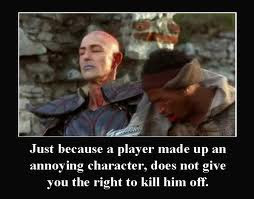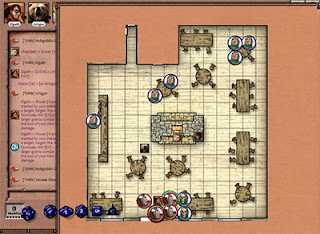What I do is my thing. It may be old school to some, new school to others, just plain screwed up to others yet. It's all really just relative isn't it? And let me tell you I've been all over this argument. Had it, won it, lost it, been utterly confused by it. There are a few wise people out there who'll try and tell you what you really need to hear: "If you aint having fun you aint doin it right." And that's all you need to know. It's a game after all.
The other day I had some kids come to my classroom after school and wanted to run an OSRIC game. The guy they had lassoed was actually a HS kid that had played some OSRIC with a couple other guys and said he would DM the younger guys. They were all stoked beyond belief. Since we had to cancel the game club at that time, they have all been hungering for any kind of game. So I listened in as I worked at my desk as he ran them through creating their PCs and starting the game. Let's just say it wasn't at all what you might expect from an OSRIC game. The DM was telling them all sorts of stuff I knew was not in the rules, and that had nothing to do with OSRIC, let alone D&D. I thought about correcting him, but that would undermine his confidence and maybe lead to a loss of their game if they lost confidence in him. So I stayed quiet and just smiled once in awhile. Because you know what. Noone cared. They were all excited and into it.
Someone might think he was just making it up as he went along, and maybe he was. Who cares? They were gonna go have an adventure and all they needed was common consent. They were all having fun, and that's all that mattered. Now, as time goes on for them, they'll start reading the rules and start rules lawyering and maybe even move onto other games. Who cares. That's cool too. As long as they are having fun.
Because any game and I mean any game is in the eyes of those that play it. It can be whatever you make it. Take for example what Paizo has done with their most recent release:
Now, maybe you might claim they are riding the wave. But honestly the beginner's box is a good example of what a game can be when you are willing to look outside of the box. Even thought the game is billed as an intro to the full core game, I see here a way to play Pathfinder rules lite if that is your thing. I'm not sure if Paizo will put out a separate line to support the boxed set, but it doesn't really matter. A GM and players can choose to play just boxed set rules and keep it much simpler as high as they want to take it. And this is an "official" change of perspective on their bread and butter game. Frankly I love it. Even though I would prefer to play the crunchier full PF rules.
For example, since a little time has opened up, I have started a once a week game for the kids in the school club again. It's a little bit of a logistical nightmare, especially with 12 players wanting to play right now in my game. But I decided to play the game they chose -- Pathfinder, and run with it. But we are playing full rules. We are even allowing lots of 3.5 stuff in if it's approved. But what I'm doing with the game is tricking it out to my liking. There are actually lots of optional rules out there for PF and more coming all the time. I'm ramping up combat and implementing an advanced critical hit matrix, and expanding the information on grievous wounding. I tend to be a GM that requires teamwork by constructing challenges that cannot be overcome alone. Going it alone in my dungeons is never a good idea. Challenges either have multiple layers, or require more than one person to navigate. I also strongly encourage intelligent roleplay. You have to be very careful and considered when confronting beasties in my dungeons. They are not plastic cutouts to simply be knocked over. They think, they strategize and they are evil. I also tend to make them tough. Currently I'm modifying B1 In Search of the Unknown, Hackmaster version. This adventure is excellent for all these purposes.
Some might not consider such an approach Pathfinder-like enough. But what I see is a game that has maximized the munchkin factor, and it's just gonna get worse. 3.5 and now PF is a player's wet dream if they like an endless power curve. There's balance, yeah, to a point. But I'm not hung up on balance anyway. The fact is I'm a DM in a system that gives the players maximal min-max power. Alright, kewl. But have you read the Gamemastery Guide? There are lots of prose in there about tweaking things to your liking and adding in little bits that aren't presented as such in the core rules. PF is telling you in so many words, that the GM has some power too. And all those annoying Dragon Disciples and Shadow Blades and War Mages all tricked out and riding through your dungeon like sweetened up low riders through the east side of LA--well, you can meet them on their own level.
Yes it does ...
Well, okay maybe not just kill him. But you have to meet him on his level. The power curve problem that has supposedly plagued D&D from the start has never posed a problem for me. That's because I believe the game was designed not to play RAW and only RAW, but to offer a continually challenging environment for the PCs no matter how far along they got. There are tons of ways to do that, some much simpler than others. But it isn't really hard. Any game worth it's salt allows that and builds it into the system, even if it is an open invitation to make it up as you go along.
Cause let's face it, the one thing that can kill creativity faster than anything is someone claiming authority over your creativity. Someone saying you can't do this or that. This or that isn't allowed. That's why so many artists are avante garde, out at the edge, pushing the limits. Not that it's always good to do so, there is a right and a wrong time. It has to be done artfully, not just for the sake of being rebellious. But artfully. An artists doesn't throw out the rules. She works with them in ways noone has ever thought of before. And in a way, authority is an integral part of this process. so I suppose that in a way authority is as much a part of the creative process as the rejection of it.
Work with your players to challenge them, not against them. Noone can really tell you how to do it. I mean they can teach you the basics of the game, but ultimately you will have to find your own way in RPGs. Along the way you will find people that like the way you do things, or learn to like it. That's cool, and in that way RPGs stay alive for us and the next generation. And remember that if you're not having fun you're not doin it right.












